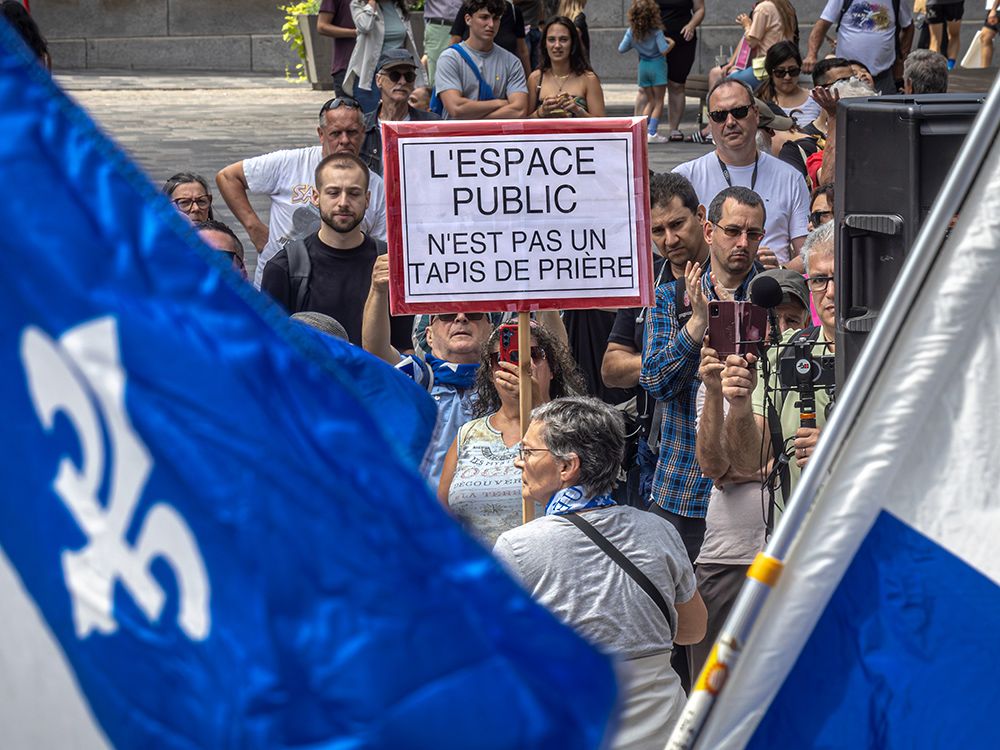
Quebec’s government is preparing legislation that would forbid people from praying in public spaces such as streets and parks.
The plan marks the latest step in the province’s long-running push to entrench laicity, a policy of strict separation between religion and the state.
What is being proposed?
Jean-François Roberge, Quebec’s minister responsible for secularism, said this week the Coalition Avenir Québec (CAQ) government will table legislation this fall to ban “prayers in the street.”
He wrote on social media: “The proliferation of prayers in the street is a serious and sensitive issue in Quebec. Last December, our government expressed its malaise in the face of this phenomenon, which is more and more present in Montreal. The premier of Quebec gave me a mandate to reinforce laicity, and I have the firm intention of fulfilling this mandate with diligence.”
Few details were offered. Right now, it is not clear which spaces would be included or whether exceptions would be made.
Why now?
The announcement comes days after the release of a 278-page advisory report on secularism . The report recommended leaving decisions on public prayers to municipalities, arguing they already had the legal authority to manage use of public spaces. The government rejected that advice and opted to take action itself.
Though Roberge did not mention any particular faith in his announcement, he referred to a “proliferation of street prayers,” calling it an “increasingly visible phenomenon, particularly in Montreal.” And that debate has been shaped by events in recent years. Since the Hamas attacks of Oct. 7, 2023, several pro-Palestinian demonstrations in Montreal have featured large groups of worshippers praying in the street.
The scenes have triggered counter-demonstrations by activists who argue such displays undermine Quebec’s secular values. Posters circulated this summer declared, “The streets of Montreal are not open-air mosques.”
Premier François Legault has also expressed discomfort with the practice. “To see people praying in the street, in public parks, this is not something we want in Quebec,” he said in December.
“When you want to pray, you go in a church or a mosque, not in a public place.”
How would it work?
The government has not yet published a draft bill.
If the bill is challenged in court, Quebec could invoke the Constitution’s notwithstanding clause, which allows governments to override certain Charter rights for renewable five-year periods.
The province has already used the clause to shield previous secularism and language laws from legal challenges.
Last December, Legault did not rule out using the notwithstanding clause: “Right now, we’re studying all options,” Legault said. “I’m not saying it’s a no.”
How does this fit into Quebec’s secularism laws?
Quebec already has some of the toughest secularism rules in North America:
- Bill 21 (2019): Bars public school teachers, police officers, judges and other state employees from wearing visible religious symbols.
- Bill 96 (2022): Strengthened protections for the French language, also insulated from court challenges by the notwithstanding clause.
Extending restrictions to public prayer would mark a significant expansion, moving from the workplace into public life.
How are political rivals reacting?
Quebec’s Liberal opposition has noted municipalities already have the power to regulate gatherings in public spaces, and that occupying those spaces without a permit is already prohibited.
Meanwhile the Parti Québécois (PQ), which has long championed stricter secularism rules, quickly claimed credit.
Its leader Paul St-Pierre Plamondon said the CAQ acted only after the PQ launched a referendum among members on whether to support a ban on public prayers.
With provincial elections due in 2026, identity and secularism issues are once again dominating Quebec’s political debate.
What do critics say?
Religious and civil liberties groups have condemned the proposal.
The Canadian Muslim Forum said a blanket ban would stigmatize communities and undermine social cohesion.
The Canadian Civil Liberties Association described the move as a violation of fundamental freedoms, including religion, expression and peaceful assembly.
Likewise, the Ligue des droits et libertés said the law would disproportionately target Muslim citizens under the guise of secularism.
What happens next?
Roberge says the government’s caucus has already discussed the issue and that work on the bill is “well advanced.”
It is expected to be tabled this fall.